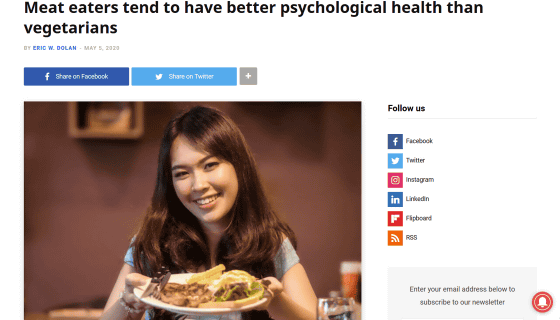Research shows that meat eaters are mentally healthier than vegetarians

In recent years, the number of people who choose vegetarianism for reasons other than religion is increasing, based on the idea that “animals should not take life for humans” and that “eating meat is bad for your health”. Meanwhile, a study conducted by an American team revealed that vegetarians are more likely to have mental problems than meat eaters.
Full article: Meat and mental health: a systematic review of meat abstention and depression, anxiety, and related phenomena
https://www.tandfonline.com/doi/full/10.1080/10408398.2020.1741505
New psychology research finds meat eaters tend to have better mental health than vegetarians
https://www.psypost.org/2020/05/meat-eaters-tend-to-have-better-psychological-health-than-vegetarians-56698

The research team surveyed 18 previously conducted studies on meat consumption and psychological health. In focusing on psychological health, Dobersek and colleagues focused on factors such as depression, anxiety, self-harm, perceived stress, and quality of life, based on past research published between 1997 and 2019. It is said to have investigated.
It seems that 18 studies differed in the rigor and bias of the survey, but in total included a huge number of subjects of 149,559 'meat eaters' and 8584 'vegetarians'. , The area where the research was conducted was wide-ranging in Europe, North America, Asia, and Oceania. The word 'vegetarian' is used differently by different people, but the research team extracted and analyzed past studies that clearly defined 'people who do not eat meat at all' as vegetarians.

Of the 18 studies, 14 were investigated for symptoms associated with depression and anxiety. Seven of the 14 studies found that 'people who avoid meat consumption are at higher risk of depression and anxiety', and two studies say that 'people who eat meat are more There is a high risk of depression and anxiety. ' The remaining studies showed no significant differences or mixed results.
In addition, three studies that investigated self-harm all found that vegetarians were more likely to self-harm than meat eaters. Of these, a study conducted on 9113 women living in Australia found that the rate of self-harm was three times higher in vegetarians, and 4746 Americans A study of adolescents also found that vegetarians were more than twice as likely to have attempted suicide.
On the other hand, in four studies focusing on stress and two studies focusing on quality of life, no significant difference was found between meat eaters and vegetarians. “My co-authors and I were really surprised that avoiding meat eating and increasing mental problems are consistently linked within the population,” said Dobersek.

However, the set of results alone cannot identify the causal link between flesh avoidance and mental problems. Of the 18 studies surveyed this time, 16 were cross-sectional studies assessing the status of the population at a given point in time, with only one longitudinal study investigating the population over a period of time and the other
“Correlations are not causal, and we can give some explanations for this result. For example, 'People suffering from mental illness change their diet as a form of self-treatment. Sometimes, “a strict vegetarian diet causes nutrient deficiencies and increases the risk of mental illness.” “People with eating disorders use vegetarianism to hide their disability. 'People who are very sensitive to animal distress or who care about animal distress are more likely to have both depression and anxiety,' said Dobersek. Pointed out.
There are many vegetarian and nutritional research findings out there, but the average individual lacks the knowledge and experience to map a single research result into more literature on historical and scientific knowledge. It is said that there is. Associate professor Dobersek argued that this problem caused the 'diet war' to the world and the 'wrong truth about nutrition' to appear everywhere.

Related Posts:







